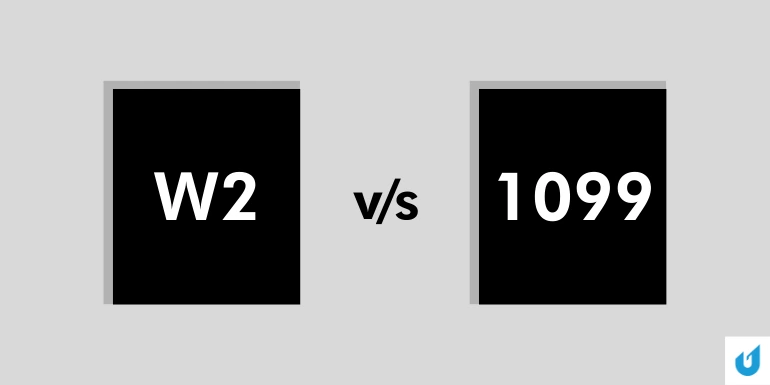W2 vs 1099
With a rise from 12.9 million in 2017 to 23.9 million in 2021, the number of independent contractors in the US is rising.
As the number of people working as freelancers or independent contractors continues to rise, you may need to adjust how you file your taxes this year. It can be confusing to know which tax form to use to report payments to an independent contractor vs. an employee, even if you know that 1099 is used to report payments to the former.
A different set of laws than an independent contractor binds a full-time employee.
Independent contractors are not considered employees. One recruits Independent contractors on a project-by-project basis or to complete duties within a set period of time.
This means they must supply their own tools and supplies for the task and that the client has no say in the manner or location. Businesses and independent freelancers should always have a formal contract when working together.
On the other hand, a full-time worker regularly reports to work or performs their duties at an agreed-upon offsite location. In addition to having to withhold taxes for things like Social Security, health insurance, and more, employers also get to decide when, when, and how their workers get their jobs done.
Comparing 1099 Workers vs. W-2 Employees
Checkout main differences between 1099 and W-2 employees below.
| W2 vs. 1099 | 1099 Workers | W-2 Employees |
| Payroll taxes | Pay their own federal income tax. There are two components to this tax: 12.4% goes to Social Security, and 2.9% to Medicare. | Medicare and Social Security take up 15.3% of an employee’s salary, each of which is split in half between the employer and the worker. |
| Benefits | Not eligible for health care, tools and resources owned by the company, or company retirement plans. | Eligible for benefits such as health, dental, and vision insurance, retirement programs, and discounts on goods and services |
| Tax forms | Forms are filled out by companies to document contractor payments. The federal, state, and self-employment tax payments made by a contractor will not be reflected on their 1099 form. | A document used by businesses to report to the Internal Revenue Service (IRS) and state and local tax authorities on the income and tax withholdings of their employees. |
With so much emphasis on compensation and legal protections for workers, it’s easy to forget that the correct classification of your personnel determines which tax form must be filed with the Internal Revenue Service.
How does the IRS decide who qualifies as a 1099 worker and who must file a W2?
The Internal Revenue Service (IRS) compiled a set of questions that can be used to classify employees as 1099 contractors or employees. In general, these aid employers in determining how much sway they have on an employee’s autonomy. Several factors are as follows:
Behavioral
Does the employer have the ability to mandate how much work an employee must do or how they must do it?
Financial
Who has the ultimate decision-making authority over the worker’s salary, equipment and supplies, and expense reimbursement: the company paying the bill?
Type of Relationship
Did the employer and employee enter a written contract outlining the terms of their relationship, including compensation, perks, and time off? Is this a continuing business between them?
With the potential for severe penalties and misclassification at stake, all businesses must take their time while answering these questions in preparation for filing their worldwide payroll. Misclassification can lead to lawsuits and severe damage to their reputation. Thus, it can be challenging to attract top staff and subject them to potentially hefty fines for infractions of tax legislation.
Fill out an SS-8 form and submit it to the IRS if you need help deciding how to classify an employee.
You could be debating right now whether it would be better for your business to recruit a 1099 worker or a W-2 worker. However, no matter your company’s standing, you can benefit financially.
What is a 1099 employee?
A 1099 worker is an independent contractor and not a full-time employee. 1099 employees, also known as freelancers, independent contractors, and self-employed workers, pay their own income taxes to the IRS each year.
Since 1099 employees are considered independent contractors, they are free to work for anybody they choose and are not limited to a single employer. 1099 workers often charge per contract because they simultaneously provide services to multiple companies.
To give some examples of 1099 employees:
- Freelance writers who work on an assignment basis without set hours
- Consultants who help your company with a clear start and end date
- Gig workers who perform services receive payment through an app
- Freelance designers and developers who work project by project
For tax purposes, every single sort of 1099 worker (regardless of industry, the scope of work, or level of expertise) must complete a 1099 form.
1099 tax form
Businesses that pay independent contractors or other non-employees throughout the tax year must file IRS Form 1099-MISC during the tax filing season. 1099 form is typically unnecessary for individual tax filers. The only time this is different is if you are a small business owner and you have hired an independent contractor. If not, the burden of completing and filing 1099 forms falls on businesses and financial institutions by January 31st.
There are different types of 1099 employee forms to fill out for different types of contractors:
• Form 1099 – These are the forms used by firms to report payments made to a freelancer or contractor within a given accounting period.
• Form 1099-MISC: Miscellaneous Income – If you have worked as an independent contractor or if you are self-employed with multiple clients, please fill out this form. Complete a separate 1099-MISC form for each customer who paid $600 or more. A company should complete a form for the IRS (commonly called Copy A) and provide a copy to the contractor (called Copy B)
• Form 1096 – Complete 1096 form to provide a summary of all 1099s you filed and sent to the IRS by the end of January.
Earnings reported on 1099 forms are generally not subject to withholding taxes. This is a significant distinction between independent contractors, who receive 1099 forms, and regular employees, who receive W-2 forms.
Streamline 1099 filing and issue forms seamlessly. Reach out for stress-free solutions now!
What Is a W-2 employee?
In most cases, workers fall into the W-2 category.
An employee who obtains a W-2 tax form from their employer is known as a W-2 employee. W-2 workers are the most common type of workers in the United States.
They clock in daily, do their jobs, and get salary biweekly or monthly. W-2 employees sign an agreement for an extended period of time for ongoing employment, while 1099 employees work contract to contract.
When hiring a full-time employee, businesses have more say over their hours, responsibilities, and workload than they do with 1099 workers. Employers withhold Social Security and Medicare benefits on W-2 forms, which employees are entitled to receive.
Or any other position where your company has the authority to choose the employee’s schedule and working conditions, in which case they will be a W-2 employee. Then, you will be responsible for providing them with the necessary equipment and training. An employer must file a W-2 tax form for each employee who is eligible to receive a W-2 wage statement.
W-2 tax form
The W-2 documents an employee’s earnings, benefits, and tax withholdings for a given tax year. Any employee, whether they worked for you part-time or full-time, must have a W-2 filled out for them by their employer. Any worker who received $600 or more in taxable wages or who had taxes withheld from their pay should receive a W-2 from their employer.
One must file W-2s by January 31st of the following year, the same deadline as for 1099 employees.
Employers with W-2 workers need to deduct and contribute to the federal government through Social Security and Medicare taxes.
W2 vs 1099: Which is better for you?
Despite the seeming complexity, it often helps to compare the two states visually.
Both W-2 employees and independent contractors can contribute to your company’s success, but it’s up to you to determine which is best for you. Think about the following factors when you weigh your options:
- Is this a one-time project with limited repercussions, or will it have an ongoing impact on the business?
- Is someone available immediately with a good cultural fit and has skills? Can you hire a freelancer to fill in while you search for the ideal candidate?
- How much money do you think the new employee should make? Is it better for the business to hire a freelancer or contractor instead of paying a full-time employee in order to save money on overhead?
But there are other factors to think about while talking about W2 vs 1099. A W-2 employee is a good choice if it’s critical for your company that employees stick to a strict schedule, perform only approved duties, and follow established procedures.
Generally speaking, executives are classified as W-2 employees. If you’re not in a leadership position, though, hiring a contractor with the right set of abilities can help you get more done in less time.
If you want to make the best option possible, like with any major business decision, you must consider all the aspects. Let Us Handle Your 1099 Filing – Contact Us!
FAQs – W2 vs 1099
Can you pay a 1099 employee hourly?
You’ll need to discuss payment conditions with the person you’re hiring. Usually, you will negotiate a contract that specifies how and when they will get payment. The most prevalent payment options for 1099 employees are hourly and project-based.
What is a statutory employee on W-2?
Statutory workers can submit claims for work-related costs. A statutory employee, sometimes known as an independent contractor. Then, one gets treatment for the same for tax withholding purposes as a typical employee. The employee is category is statutory if the employer and employee both contribute to Medicare and Social Security.
Do 1099 workers receive social security?
Employers who recruit 1099 workers do not deduct Social Security or Medicare contributions from the worker’s pay. Everyone is entitled to Social Security. Independent contractors, however, pay the entire share of Social Security to the IRS.
When are 1099s due to contractors?
Form 1099s are due by January 31st. If you paid a contractor $600 or more for services delivered throughout the year, you’d need to file a 1099-NEC. Then, submit a copy to your contractor. One need to supply information on January 31st, the year following payment.
How do 1099 employees pay taxes?
Independent contractors submit their earnings to the IRS four times a year with Form 1040-ES, Estimated Tax for Individuals. This is sufficient to pay their federal income tax and self-employment tax obligations. Depending on their state, they may also need to pay state and local taxes.
What happens if you don’t file the 1099 form?
You will typically be notified if the IRS still needs to receive your 1099 form. If you have unpaid taxes, they will retrospectively charge you fines. Also, interest will start on the first day they think you owe tax. Penalties per form can vary from $50 to $280.
Can a W-2 employee also be a self-employed contractor?
A W-2 employee can become a 1099 independent contractor if they meet IRS requirements. A maintenance technician, for example, may own a supply store. One can offer them equipment for the business.
How many 1099 employees may a business employ?
As long as businesses identify 1099 workers correctly, they may hire as many independent contractors as they like. When hiring a 1099 employee, you must have a written contract outlining their role within the company. Contractors earning over $600 a year must submit Form 1099-MISC to the IRS and provide a copy to themselves.
Do you have to pay overtime to 1099 employees?
Contractors are independent workers. The Fair Labor Standards Act (FLSA) says that only workers are subject to minimum pay and overtime regulations. This means that 1099 workers won’t get compensation for working above 40 hours per week.
Want to outsource Payroll Tax? Get tax preparation outsourcing services from experts now.





